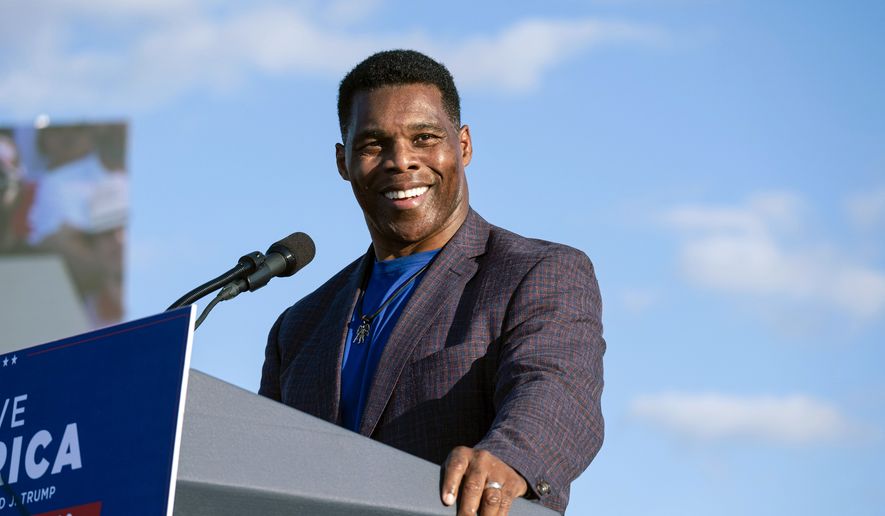A record number of Black Republicans are running for Congress this year, and the party says the trend accelerated with Donald Trump’s expansion of the conservative base in his 2016 campaign for the White House.
If elected, however, the Black Republicans won’t be invited to join the Democratic-dominated Congressional Black Caucus, members told The Washington Times.
The National Republican Congressional Committee counted 81 Blacks running as Republicans in 72 congressional districts this year, up from 27 in the 2020 election cycle.
NRCC spokesman Mike McAdams called the numbers “a record in the modern era” for his party.
Three Black Republicans, Rep. Byron Donalds of Florida, Rep. Burgess Owens of Utah and Sen. Tim Scott of South Carolina are serving in Congress. This contrasts with 55 Black Democrats from congressional districts and the two delegates from the District of Columbia and the U.S. Virgin Islands.
Mr. Donalds, a first-term lawmaker, said more Black people are running on the Republican ticket because they see more Black Republicans in office, shattering a longtime stigma in Black communities.
“They see me. They see Burgess. They saw [Rep. Allen West of Florida]. They saw [Rep. Mia Love of Utah]. They see [Virginia Lt. Gov.] Winsome Sears. They see [North Carolina Lt. Gov.] Mark Robinson,” he said. “And what they say is, ‘You know what? Maybe I should step up, too.’”
Mr. Donalds said he and other Black officials break the narrative that Black people are duty-bound to vote for Democrats.
“They’re seeing the awful things that Democratic policies have brought to their communities, and they’re just not taking it anymore. They’re looking for a new way,” he said. “And so they’re turning to Republicans because we have the answers.”
The first five Black members of Congress, all Republicans, were sworn into the 42nd Congress in 1871. Their ranks swelled to seven by 1873. That remained steady until the beginning of the 45th Congress in 1877, when the number of Black Republicans dropped to three.
That number continued to dwindle after the end of Reconstruction in the South. From 1901 to 1929, no Black Republicans were serving in Congress. After Rep. Oscar Stanton DePriest of Illinois left office in 1935, Congress had no Black Republicans until Rep. Gary Franks of Connecticut took the oath of office in 1991.
The numbers of Black Democrats in Congress grew steadily every decade since 1935, starting with Rep. Arthur Mitchell of Illinois.
Black Democrats currently serving in Congress told The Washington Times that more Black Republicans would add diversity to Capitol Hill, but they cautioned that the newcomers’ political views could marginalize them.
Rep. Danny K. Davis of Illinois said he does not expect the Congressional Black Caucus to welcome any Black Republican.
“Now, if they were to vote from time to time for issues that would be amenable and in the best interest of Blacks, there would be some welcoming,” he said. “But I don’t think they would. I’m saying, I think they would pretty much stick with the status quo.”
He added, “I think there’s an effort to recruit Blacks, but I don’t think it’s going to change anything because there won’t be enough Blacks ideologically who agree with much of the Republican philosophy.”
House Majority Whip James E. Clyburn, South Carolina Democrat, said “diversity is great” on Capitol Hill.
Wesley Hunt, a Black Republican recruited by House Minority Leader Kevin McCarthy of California, won the Republican primary for Texas’ 38th Congressional District last week. The Cook Political Report rates the seat as solid Republican.
John James of Michigan, who graduated from West Point with Mr. Hunt and roomed with him at the military academy, is another Black Republican running for the lower chamber.
Mr. James ran unsuccessfully for the Senate in 2018 and 2020 against Democratic incumbents Debbie Stabenow and Gary C. Peters, respectively. Mr. Peters narrowly defeated Mr. James by 1 percentage point.
This time, Mr. McCarthy recruited him to run in Michigan’s 10th Congressional District, which covers the Lower Peninsula north of Detroit, an area known as “The Thumb” of the state. Cook rates the district as leaning Republican.
Mr. McCarthy said the number of Black Republican candidates should have increased a long time ago.
“I think it’s fabulous,” he said in an interview. “We’ve got some amazing people who are running.”
In 2020, Mr. Trump picked up 8% of the Black vote, a roughly 2 percentage point increase from 2016, according to AP VoteCast. Mr. Trump, who campaigned in 2016 on bringing more Black voters into the party, is endorsing several Black Republican candidates this cycle, including Georgians Herschel Walker for the Senate and Vernon Jones for the House.
Gary Maloney, a Republican consultant whose Oxford doctoral thesis analyzed Black voting, said most Republicans want to vote for a Black candidate who agrees with their political views.
“More than ever before, Republican voters have African American neighbors, friends, churchgoers and schoolmates. So much integration has been achieved, especially in the suburbs, compared to decades past,” he said. “Culturally, I think, Trump’s strongman leadership style won new Black support in 2020. Whether that translates to long-term voting or Trump-like Black candidates is uncertain.”
Mr. Maloney said the Republican Party “still has a lot of work ahead to find support and leaders among Black women” and would benefit from a candidacy from somebody like Fox News Channel host Harris Faulkner.
“The GOP continues to lag among African American women,” he said.
• Kerry Picket can be reached at kpicket@washingtontimes.com.




Please read our comment policy before commenting.